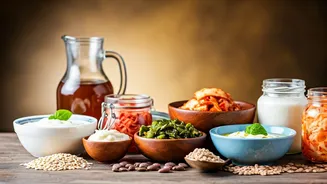The Gut-Health Connection
The health of our gut plays a pivotal role in overall well-being, often influencing aspects beyond just digestion. A balanced gut microbiome, populated
with beneficial bacteria, is crucial. Probiotics, live microorganisms that offer health benefits when consumed, become central to this balance. Probiotic foods provide a natural way to introduce these beneficial bacteria into your system, creating a favorable environment for digestion, nutrient absorption, and immune function. Consuming these foods helps crowd out harmful bacteria, strengthening the gut lining and reducing inflammation. They are packed with essential nutrients and compounds, offering additional health benefits, ensuring the gut remains strong and resilient against diseases. Embracing probiotic-rich foods can lead to improved energy levels, clearer skin, and an enhanced sense of well-being.
Yogurt: A Creamy Classic
Yogurt, particularly varieties containing live and active cultures, is an accessible and widely consumed probiotic food. The fermentation process involved in yogurt production cultivates beneficial bacteria like Lactobacillus and Bifidobacterium. These bacteria actively contribute to digestive health by aiding in the breakdown of food and improving nutrient absorption. Greek yogurt stands out as a particularly rich source of protein, offering an added nutritional benefit. When selecting yogurt, it's crucial to check the label for 'live and active cultures' to ensure the presence of probiotics. Enjoying yogurt can be as simple as having a cup for breakfast, mixing it into smoothies, or using it as a base for dips and sauces. Opting for plain yogurt and adding your own fruits and sweeteners can help reduce added sugars and maximize the health benefits, making it a versatile and delicious addition to your diet.
Kefir: The Cultured Drink
Kefir, a fermented milk drink, often described as a more potent version of yogurt, is a nutritional powerhouse. It's made by adding kefir grains to milk, allowing it to ferment. Kefir grains are not actual grains but colonies of bacteria and yeast that ferment the sugars in milk. Kefir boasts a diverse range of probiotic strains, offering a broader spectrum of benefits than yogurt. These strains include Lactobacillus, Bifidobacterium, and Saccharomyces, which are known to enhance gut health and boost immunity. The fermentation process also creates vitamins and enzymes, enhancing its nutritional profile. Its tangy and slightly effervescent flavor makes it a refreshing drink. Kefir can be consumed on its own, added to smoothies, or used in baking. The consistency is thinner than yogurt, so it’s easy to drink and incorporate into your daily routine. Kefir’s comprehensive probiotic profile and rich nutrient content make it an outstanding choice for promoting overall health and digestive wellness.
Sauerkraut: Cabbage's Transformation
Sauerkraut, fermented cabbage, is a traditional food rich in probiotics and vitamins. Its probiotic benefits arise from the lactic acid bacteria created during fermentation, transforming the humble cabbage into a powerhouse for gut health. This fermentation process not only preserves the cabbage but also increases its nutritional value, including vitamins C and K. When choosing sauerkraut, look for varieties that are unpasteurized, as pasteurization kills the live and active cultures. Enjoying sauerkraut can be as simple as adding it to salads, sandwiches, or as a side dish. The sour, tangy flavor of sauerkraut can add a delightful complexity to meals while providing a substantial dose of probiotics. Its fiber content further supports digestive health. By adding sauerkraut to your diet, you support gut health and enjoy a flavorful and nutritious food with a rich history.
Kimchi: Spicy and Beneficial
Kimchi, a traditional Korean side dish made from fermented vegetables, is celebrated for its spicy flavor and remarkable health benefits. Its fermentation process, similar to sauerkraut, cultivates probiotics, mostly lactic acid bacteria. This process enhances the nutritional profile, providing vitamins, minerals, and antioxidants. Kimchi often includes ingredients like garlic, ginger, and chili peppers, adding unique flavors and potential health benefits. These ingredients contribute to its anti-inflammatory properties and immune-boosting qualities. Consuming kimchi can support digestion, enhance gut health, and contribute to overall well-being. It can be added to rice dishes, soups, or enjoyed as a flavorful side. The vibrant flavors and unique textures make kimchi a versatile and beneficial addition to any diet. Its combination of probiotic benefits and rich flavor makes it a superfood.
Kombucha: The Tea Tonic
Kombucha is a fermented tea drink that has gained popularity for its potential health benefits and unique taste. Made by fermenting sweetened tea with a SCOBY (Symbiotic Culture of Bacteria and Yeast), kombucha is a source of probiotics, vitamins, and antioxidants. The SCOBY converts the tea's sugar into beneficial acids and compounds. The probiotics present in kombucha, mainly lactic acid bacteria and acetic acid bacteria, contribute to a healthy gut microbiome and support digestive health. When choosing kombucha, opt for brands that are unpasteurized to ensure the live cultures are preserved. Kombucha is available in various flavors and can be consumed as a refreshing beverage or added to smoothies. Its slightly tart and effervescent taste makes it an enjoyable way to introduce probiotics into your diet. Its refreshing properties and probiotic content offer a delicious way to support gut health and overall wellness.
Pickles: Not All Are Equal
Pickles, especially those made through fermentation, can be a surprising source of probiotics. The key is to choose naturally fermented pickles, as opposed to those made with vinegar. Natural fermentation involves lactic acid bacteria, which thrive in a salty environment and produce probiotics during the fermentation process. These beneficial bacteria contribute to gut health and can help improve digestion. When selecting pickles, check the label to ensure they were fermented, usually identified by ingredients like salt and water instead of vinegar. Pickles can be eaten as a snack, added to sandwiches, or used as a flavorful ingredient in various dishes. Their tangy flavor and satisfying crunch make them a convenient way to boost your probiotic intake. Including fermented pickles in your diet can support gut health and provide a delicious and beneficial addition to your meals.













